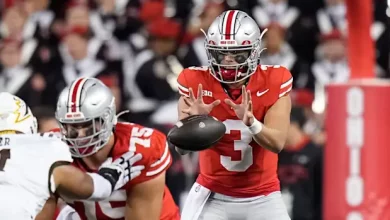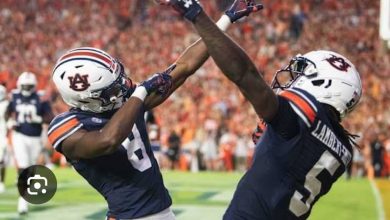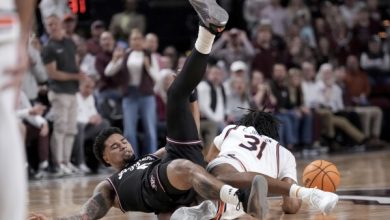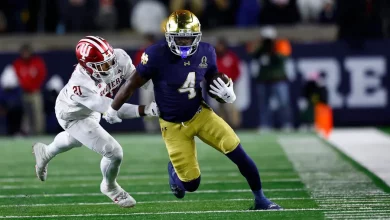Jeff Prosser slams Nico Iamaleava, saying he’s a quarterback he’d never want after an NIL standoff led Tennessee to move on from the young star.

In the world of college football, the rising power of NIL (Name, Image, Likeness) deals is reshaping the landscape, with players now holding unprecedented influence over their financial futures. While this new age of college sports offers exciting opportunities for athletes, it’s also bringing some dark clouds over the sport’s integrity. No one has highlighted this tension more sharply than radio host Jeff Prosser, who didn’t hold back in his criticism of Tennessee quarterback Nico Iamaleava. The young QB, embroiled in an NIL dispute, found himself at the center of controversy when Tennessee reportedly decided to cut ties with him—leading Prosser to voice his strong opinions on the situation.
In a world where NIL money is becoming the driving force behind many athletes’ decisions, is loyalty to a team or program still important? Can a student-athlete balance personal success with a sense of duty to the school that brought them into the national spotlight? These are the questions at the heart of the conflict surrounding Nico Iamaleava and, more broadly, the potential future of college football.
A New Age of College Football
Before diving into Jeff Prosser’s harsh words about Iamaleava, we need to understand the context in which these remarks were made. The NIL era, officially kicking off in 2021, marked a monumental shift in college athletics. College athletes, once forbidden from profiting off their name, image, or likeness, were suddenly free to sign endorsement deals, land sponsorships, and profit from their fame.
For many, this has been a long-overdue change, righting an imbalance where the NCAA, universities, and coaches profited immensely off athletes while those same athletes saw little return on their hard work, talent, and exposure. In theory, NIL was designed to level the playing field, offering athletes a way to cash in while still preserving the essence of college sports—providing them an opportunity to grow, develop, and eventually reach professional leagues.
However, reality has proven more complicated. While NIL has provided athletes with financial opportunities, it has also led to a toxic, unpredictable environment in which high school recruits and college players are using their market value to hold programs hostage. NIL money has become a primary bargaining chip in recruitment, with collectives, boosters, and agents driving the money trail, forcing schools to fork over huge sums to lure top prospects.
In many cases, NIL deals are negotiated before the athlete has even stepped foot on campus, and for many fans, this is where the trouble begins. The idea that a young, untested player could demand millions before proving themselves on the field raises eyebrows and creates division between schools, players, and the fans who feel betrayed.
Nico Iamaleava: The Golden Boy of College Football
Nico Iamaleava, a 6’5″, 200-pound quarterback, was the most highly sought-after recruit in the class of 2023. His athleticism, arm strength, and poise in the pocket made him a consensus five-star recruit, and he committed to Tennessee with the expectation of becoming the next great quarterback for the Volunteers. His arrival was met with immense hype. Coaches and fans alike were ecstatic about the potential of Iamaleava leading the program into a new era, one where they could compete for championships and solidify Tennessee’s place as a powerhouse.
But as with any great talent, there’s always pressure. Iamaleava’s commitment to Tennessee wasn’t just about his future as a player—it was about the dollars and cents that followed him. Word began to spread that Iamaleava was receiving substantial NIL offers even before he set foot in Knoxville. Reports indicated that his NIL value was in the millions, with some even speculating that the package could reach upwards of $8 million, depending on the collective offers on the table.
As the demands for Iamaleava’s NIL package grew, so did the tension between him and Tennessee. For fans and analysts alike, the situation was growing increasingly uncomfortable. A player who hadn’t yet played a down for the team was already leveraging his market value, leading to widespread concerns about the future of college football. Was Iamaleava’s commitment to Tennessee one of genuine love for the program, or was it more about the money?
The NIL Standoff and Tennessee’s Decision
In the end, it wasn’t just the dollars that caused friction. It was the manner in which those dollars were being pursued. Reports suggest that the negotiations surrounding Iamaleava’s NIL deal had become contentious, with conflicting expectations between the player’s camp and the Tennessee athletic department.
At the heart of the issue was a breakdown in the relationship between Iamaleava and Tennessee. It’s believed that his camp had become more focused on maximizing NIL earnings rather than investing time and energy into establishing a long-term commitment to the program. As the drama unfolded, Tennessee made the difficult decision to part ways with Iamaleava, officially cutting ties with him before he could ever take a meaningful snap.
For Tennessee, the decision to move on was undoubtedly a tough one, as it meant abandoning a high-profile recruit who could have transformed their offense. But the message was clear: Tennessee would not allow itself to be held hostage by NIL demands or be reduced to simply being a stepping stone for a player chasing the highest paycheck.
Jeff Prosser’s Critique: A Strong Stand Against the New Norm
Enter Jeff Prosser, a radio host who’s known for speaking candidly on matters of sports and culture. Prosser wasted no time in offering a blunt assessment of Iamaleava’s actions, saying he’s a quarterback he’d never want on his team. His criticism wasn’t just aimed at Iamaleava as a player, but rather at the larger issues in college football that NIL money has exacerbated.
In an era where financial incentives seem to be the primary motivator for many recruits, Prosser’s comments were a call to arms for fans and analysts who are fed up with the new dynamics in college sports. His view is shared by many who feel that NIL deals have created an environment where loyalty to a school or team is no longer valued. Instead, players are now seen as mercenaries, willing to move based on the size of the paycheck rather than any sense of duty to the program that helped them get to where they are.
Prosser’s critique echoes a growing frustration among fans who see college football as a sport that’s increasingly becoming more about individual players and their financial gain than the teams and programs that helped them reach the top. The same principles that once made college football so beloved—teamwork, loyalty, and camaraderie—are now being overshadowed by the monetary motivations of players who are simply passing through.
The Future of College Football: A Fragile Balance
It’s clear that the dynamics in college football are changing—and not necessarily for the better. While NIL opportunities are undoubtedly beneficial for many players, they also come with a set of challenges that threaten to undermine the very essence of the sport. As recruits like Iamaleava demand larger and larger financial packages before ever stepping on the field, the sport risks losing the sense of community that has made college football so special.
For programs like Tennessee, the decision to part ways with a highly coveted recruit was a necessary one to maintain the integrity of the program. They stood firm in their belief that college football should still be about more than just the money—and in doing so, they made a difficult but necessary statement about loyalty, commitment, and the future of college athletics.
As we look to the future, it’s crucial to find a balance between compensating athletes for their talents and preserving the values that make college football great. NIL isn’t going away, but without proper oversight and thoughtful regulation, it could erode the foundations of the sport. It’s up to programs, players, and fans to come together and figure out how to move forward in a way that honors both the athletes and the game.
A New Era of College Football
While Jeff Prosser’s criticism of Nico Iamaleava may seem harsh, it serves as a reminder that college football isn’t just about talent—it’s about values, culture, and loyalty. The game has always been about more than just the players on the field—it’s about the communities, the traditions, and the fans who pour their hearts into the sport every year.
If we’re not careful, NIL could turn college football into a marketplace where money is the only currency that matters. For some, that might be acceptable. But for others, like Prosser, it’s a future they hope to avoid. As we move forward into this new era, it’s important to keep asking the tough questions—about what we want the sport to be, and how we can ensure that it stays true to its roots while adapting to new realities.
The question remains: Will the game be about the athletes, the teams, or the money? Only time will tell.









